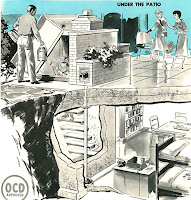Cold War Memories
I met Rodriguez through the Shalom Project. He owned a small company in Kansas City and his company profile looked very fitting with the idea of providing affordable housing. Rodriguez got unusually agitated as soon as he learned that I was from the former Soviet Union. I would understand if he was Cuban to have such reaction upon meeting a Russian citizen.
Rodriguez insisted that I should see the house he’s been working on for the last two months. I also heard the word “nuclear,” but was not sure where to place it in the context of our conversation about Kansas City and the weather.
It was one of the steamy July days. The temperature lazily sat at above a hundred and, with my habit not to drink any water, my first summer in Kansas City felt like real hell. I was happy to get out of the church building that didn’t protect from the heat and get into my car. From Central, we crossed State Avenue and then Parallel Parkway and ended up in a very quiet neighborhood. The white stone house looked newer than others. Rodriguez got out of the car and waved.
Nothing interesting, I thought. Poor house. Lots of trash outside. Wow! The whole turkey is on the top of rotten food. Someone was really rich if they threw such a big turkey out.
“Once upon a time, there was a normal man living in this house. He had a wife and two children. When he heard one day about a nuclear threat from communist Russia, he decided to dig out a shelter under the house.” Rodriguez began his surrealistic storytelling.
“This man completed his shelter and filled it with food and water. Soon, during one of the drills, he realized that the shelter would not save him and his family from the coming explosion and radiation.”
“What did he do then?” It was funny to me that a serious American man could hide under a table during the siren alarms.
“The neighbors said that the guy took no rest. He worked even harder and went even deeper. It took several years but he continued storing food and water during the construction. His family started complaining about the sacrifices they all had to make to afford a shelter.”
“Did he stop?”
“No, he didn’t; the wife left, kids grew up and left, but the man got obsessed and continued digging another shelter – this time around the first one.” The story didn’t sound as a joke, I finally realized.
“This is ridiculous! There was no threat! We never had anything against American people!”
“There is a whole generation that grew up having those drills at school.” Rodriguez looked at me with understanding, “I know it is not your fault. I just wanted you to see what your country did.”
I suddenly remembered how my American friends shared their memories of the Cold War. The whole baby boomers generation sat for hours under school desks during those nuclear drills, hating the Russians. I began feeling responsible for this, and it was weird: I was not even born back then yet.
“What happened then?”
“The man ended up alone and never stopped digging until he died. Look how much rotten food we took out of the shelter. Sixty tons."
If I try to find this house now, I probably won’t be able to do it. The present owners probably do not even know that the life in their house was connected to my country for such a long time. My hope is that with the present Russian aggressive attitude, the new owners will not start digging again.




Comments